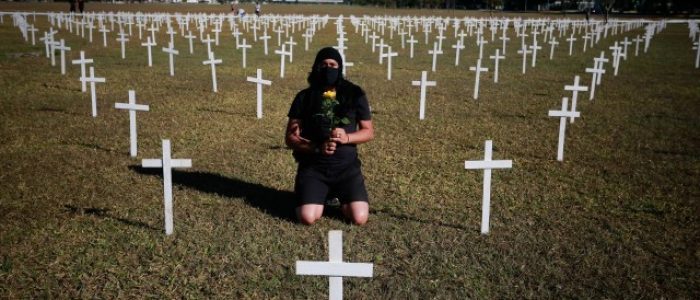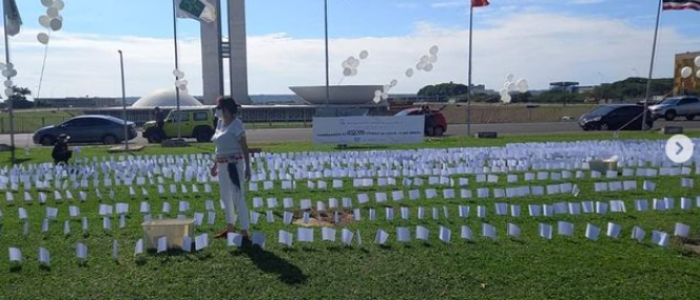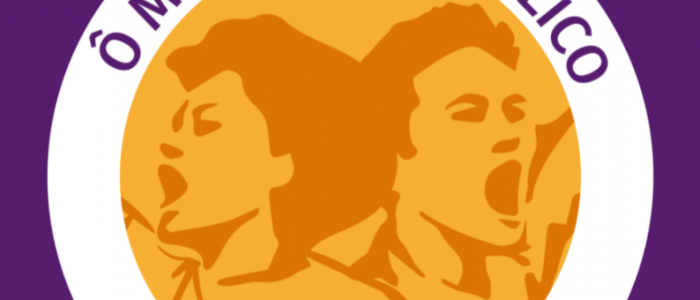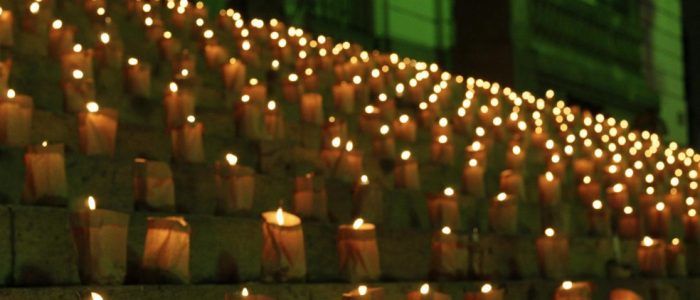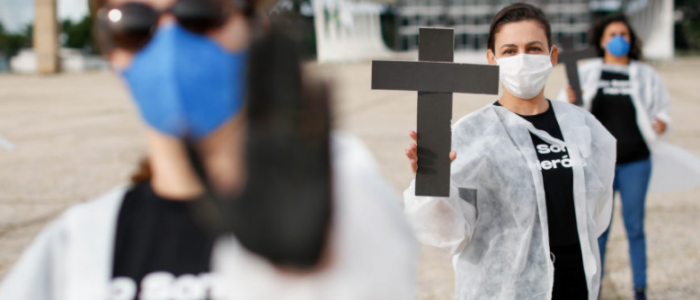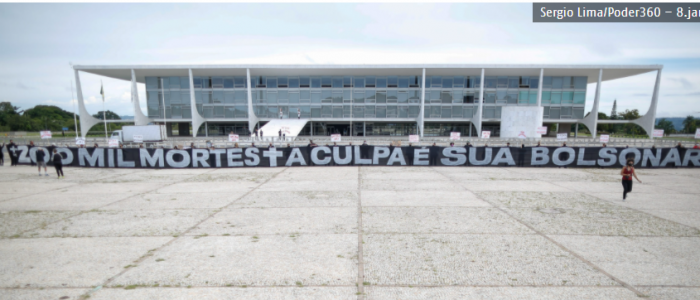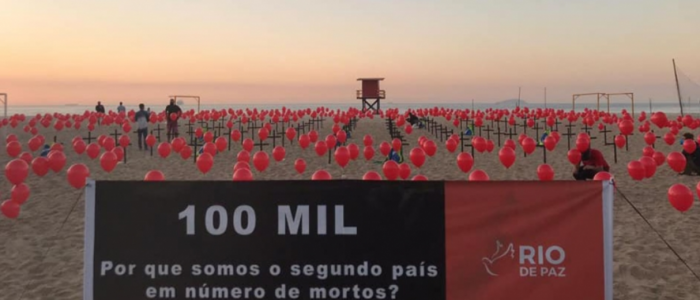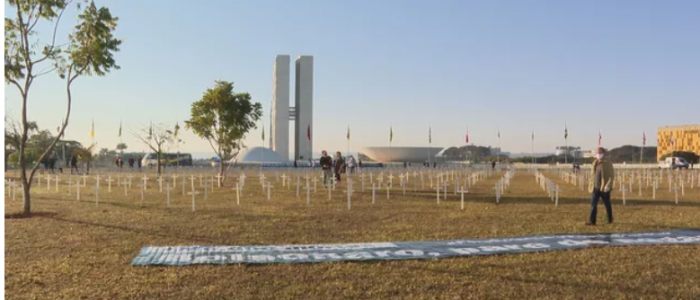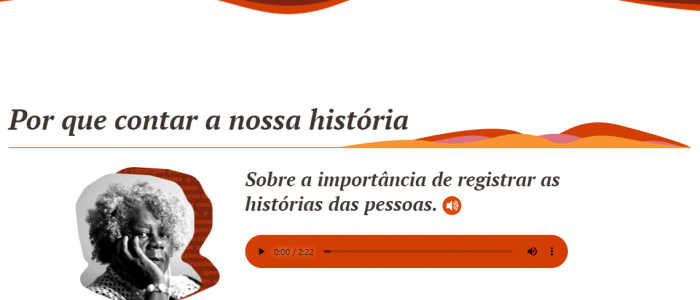Vagalumes se forma como rede de voluntários, com o objetivo de prestar homenagem aos mortos e solidariedade às famílias dos povos indígenas afetados pela Covid-19 no Brasil e em países vizinhos. Acesse aqui.
Cada uma das mortes na pandemia de Covid-19 causou sofrimento incalculável para aqueles que foram, bem como para seus familiares e amigos. As pessoas que adoeceram e sobreviveram também passaram por sofrimentos pessoais, muitas vezes enormes. Mas a pandemia também causou um trauma de ordem coletiva, um sofrimento social acentuado pela dificuldade de se realizar os ritos tradicionais de luto imposta pelas restrições a aglomerações. O sofrimento coletivo também foi intensificado pela própria negação por alguns governantes e setores da sociedade da gravidade da pandemia e da própria doença, pela falta de reconhecimento público da enorme dor pela qual a sociedade passava, bem como pela falta de resposta política e institucional a uma crise sanitária e econômica que poderia ter sido menor. Esta página foi criada para registrar a maneira que a sociedade civil brasileira vem respondendo ao sofrimento social causado pela pandemia através de ações que defendem o direito ao luto, à memória e à responsabilização dos governantes e das instituições pelo sofrimento evitável, individual e coletivo.
A professora do Resocie, Rebecca Abers, participa deste debate em recente artigo no Nexo Jornal, em colaboração com colegas da Rede Brasileira de Mulheres Cientistas.
- Grupos mobilizados: ONGs
- Tipos de mobilização: Luto, Memória e Justiça, Protestos na Era da Pandemia
Em memória aos mortos pela pandemia, ativistas colocaram mil cruzes nos gramados da Esplanada dos Ministérios (Brasília), no domingo 28 de junho de 2020.
A ONG Rio de Paz já havia feito um protesto similar no dia 11 de junho, na Praia de Copacabana.
- Grupos mobilizados: Associações de classe e Sindicatos, Coletivos
- Tipos de mobilização: Luto, Memória e Justiça
No dia do professor, 15 de outubro de 2021, a Associação de Vítimas e Familiares da COVID 19 (AVICO), com apoio da Associação de Docentes da Universidade de Brasília, do Sindicato dos Professores do Distrito Federal (SINPRO-DF), do Inesc e outras organizações da sociedade civil, organizaram um ato na Esplanada dos Ministérios, em frente ao Congressso Nacional. Foram instaladas três mil bandeiras representando os 600 mil mortos, com nomes das vítimas de Covid. Ver informações aqui, e uma reportagem aqui.
- Grupos mobilizados: Associações de classe e Sindicatos, Coletivos, ONGs
- Tipos de mobilização: Luto, Memória e Justiça
Campanha liderada pelo coletivo, O Candeeiro, A OAB Federal; o Movimento 342 Artes e Grupo Prerrogativas; e a Associação de Vítimas e Familiares das Vítimas da Covid-19 (AVICO) protocolaram pedido na Procuradoria Geral da República solicitando a denúncia perante o Supremo Tribunal Federal de crimes do presidente da República frente à Covid-19. O grupo entende que os atos do presidente representam grave perigo à sociedade mas que o processo de impeachment é demasiadamente demorado e improvável de ser aprovado no Congresso. Enquanto isso, a PGR tem o poder legal de denunciar frente ao Supremo vários atos do Presidente da República que poderiam ser julgados criminosos pelo Supremo. Se a Câmara dos Deputados autorizasse o STF a abrir um processo criminal contra Bolsonaro, ele seria afastado imediatamente para um período de 180 dias.
- Grupos mobilizados: Coletivos, Igrejas e Religiões, Mulheres
- Tipos de mobilização: Luto, Memória e Justiça, Manifestos Públicos
No mês de agosto de 2021, o coletivo Respira Brasil lançou uma campanha que busca dar visibilidade à situação das mais de 130 mil órfãs e órfãos da Covid-19. A proposta é realizar atividades de reflexão bem como de promoção de políticas públicas, a partir de uma crítica da ideia de que a direita representa a “família”. Confira o ato interreligioso no dia 20 de agosto na página de facebook do Respira Brasil.
- Grupos mobilizados: Coletivos, Igrejas e Religiões
- Tipos de mobilização: Comunicação, Luto, Memória e Justiça
Na segunda-feira, 21 de junho 2021, o movimento Respira Brasil realizou atos em diversas cidades do país em homenagem às 500 mil vidas perdidas para a Covid-19. Em cada ato, foram acesas 500 velas, cada uma representando mil mortos. O uso de velas no lugar das cruzes vistas nos atos anteriores teve a intenção de enfatizar o caráter interreligioso do ato, usando um símbolo aceito por diversas religiões e até por não religiosos. O ato foi realizado no Rio de Janeiro, São Paulo, Natal, Maceió, Campinas, Diadema, Vitoria, entre outras cidades. A campanha utiliza a #LutoPorMeioMilhão.
- Grupos mobilizados: Coletivos
- Tipos de mobilização: Luto, Memória e Justiça
Movimentos sociais de Vitória (ES) realizaram ato na Praia de Camburi no dia 27 de junho de 2021 em homenagem aos 500 mil mortes causadas pela Covid-19. Confira reportagem aqui.
- Grupos mobilizados: Associações de classe e Sindicatos, Mulheres
- Tipos de mobilização: Luto, Memória e Justiça, Manifestos Públicos, Protestos na Era da Pandemia
No dia 1º de maio de 2021, um grupo de enfermeiras e enfermeiros realizaram um ato em homenagem aos mais de 400 mil mortes pela pandemia de Covid-19 no Brasil e em defesa de direitos trabalhistas da categoria. O ato ocorreu um ano depois de um protesto realizado pelo setor também em frente ao Planalto em que manifestantes foram hostilizados por militantes pró-Jair Bolsonaro. A imagem de uma enfermeira sendo agredida foi amplamente disseminada nas redes sociais como representação da polarização política em torno da pandemia. Confira a reportagem aqui. Atos como estes foram ofuscados pela onda de manifestações pró-governo que ocorreram no mesmo dia.
- Grupos mobilizados: Associações de classe e Sindicatos, Coletivos
- Tipos de mobilização: Luto, Memória e Justiça
Criada em 30 de Abril de 2021, a Associação Vida e Justiça em Apoio e Defesa dos Direitos das Vítimas da COVID-19 busca criar uma rede nacional de apoio e solidariedade às vítimas vivas e aos familiares das vítimas fatais da Covid-19. “A Associação Vida e Justiça é um espaço de solidariedade humana, de defesa e promoção da vida, de articulação de políticas públicas de apoio e reparação das vítimas e trabalha pela responsabilização de gestores públicos negligentes com a pandemia da Covid19.”
A associação é organizada por 13 temas, cada um com coordenação nacional, bem como seccionais nos Estados e no Distrito Federal, atualmente em criação. As atividades envolvem desde a organização de diálogos com a sociedade através de uma grande rede de lideranças sociais até a elaboração de propostas de políticas públicas e de legislação orientadas para a memória, justiça, reparação e responsabilização institucional pelos impactos da Covid-19 no futuro do país.
- Grupos mobilizados: Coletivos
- Tipos de mobilização: Luto, Memória e Justiça, Manifestos Públicos
Esta página no facebook é uma das iniciativas da Rede de Apoio às Famílias de Vítimas Fatais de Covid-19 no Brasil, uma rede emergencial formada por vários voluntários, profissionais e pessoas solidárias às famílias de vítimas no país, em sua homenagem. É possível encontrar postagens de homenagem à vitimas de Covid-19.
- Tipos de mobilização: Luto, Memória e Justiça
A Associação das Vítimas e Familiares de Vítimas de Covid-19 – AVICO Brasil foi fundada em 08 de abril de 2021 na cidade de Porto Alegre/RS, a partir da indignação de dois defensores dos Direitos Humanos, Gustavo Bernardes e Paola Falceta, com a ineficiência e negligência do Estado diante das múltiplas consequências da pandemia de Covid-19 na vida dos brasileiros. O coletivo é formado por sobreviventes e familiares de vítimas voluntários e tem como objetivos prioritário representar os interesses gerais e individuais de seus associados (e não-associados) relativos às vítimas da COVID-19. A associação também vem criando grupos de encontro terapêuticos com enlutados. Em junho 2021, protocolou junto à Procuradoria-Geral da República (PGR) uma representação criminal contra o presidente Jair Bolsonaro (sem partido) por negligência em relação à pandemia. Em agosto, protocolou um pedido de impeachment do presidente.
- Grupos mobilizados: Coletivos, Igrejas e Religiões
- Tipos de mobilização: Luto, Memória e Justiça, Manifestos Públicos
No dia 28 de março de 2021, Dia Nacional da Solidariedade, o CONIC, juntamente com o #RespiraBrasil, reuniu diferentes tradições religiosas, organizações e movimentos, na realização de um ato inter-religioso “Um Milhão de Velas pela VIDA”. Assista o vídeo aqui.
- Grupos mobilizados: Associações de classe e Sindicatos, Conselhos
- Tipos de mobilização: Luto, Memória e Justiça, Protestos na Era da Pandemia
Em ato realizado no dia 25 de março de 2021, organizado pelo Conselho Nacional de Saúde, o Sindicato de Enfermeiros do Distrito Federal, o Sindicato dos Odontólogos, o Conselho de Saúde do DF, e a OAB do DF, foi realizado um cortejo fúnebre simbólico em homenagem aos 300.000 pessoas que perderam as vidas pela Covid-19. Vestindo camisetas pretas, manifestantes marcharam em direção ao centro da praça, carregando um caixão com um mapa do Brasil, em simbologia às mortes ocorridas em todo o país. Em seguida, cada um dos participantes depositou uma rosa em cima da urna funerária. Veja reportagem aqui.
- Grupos mobilizados: Igrejas e Religiões
- Tipos de mobilização: Luto, Memória e Justiça, Manifestos Públicos, Protestos na Era da Pandemia
Articulação criada em fevereiro de 2021 por lideranças religiosas de uma diversidade de fés, ligadas ao CESEEP (Centro Ecumênico de Serviços à Evangelização e Educação Popular). O ponto de partida do movimento foi o lançamento do Manifesto Respira Brasil que defende vacina para todas e todos, o SUS, a ampliação do Auxílio Emergencial e o impeachment de Bolsonaro. Um eixo central da rede é a luta pelo direito ao luto e aos rituais fúnebres, e pelo reconhecimento público do sofrimento das mortes causadas pela Covid-19. Veja a página no Facebook do grupo aqui.
- Grupos mobilizados: Coletivos
- Tipos de mobilização: Luto, Memória e Justiça, Protestos na Era da Pandemia
- Grupos mobilizados: ONGs
- Tipos de mobilização: Luto, Memória e Justiça, Protestos na Era da Pandemia
No dia 8 de agosto de 2020, a ONG Rio da Paz mais uma vez realizou ato na Praia de Copacabana, instalando cruzes e balões vermelhos para homenagear os 100 mil mortos brasileiros devido à Covid-19. Confira um vídeo do ato aqui.
- Grupos mobilizados: Associações de classe e Sindicatos, Conselhos, ONGs
- Tipos de mobilização: Luto, Memória e Justiça, Manifestos Públicos, Protestos na Era da Pandemia
Onze centrais sindicais em parceria com diversos movimentos sociais organizaram no dia 7 de agosto de 2020 atos simbólicos em São Paulo, Recife, Salvador, Porto Alegre, e várias outras cidades em homenagem aos 100 mil mortos pela Covid-19 e em defesa da vida, do emprego e chamando a população a contribuir em ações solidárias. Confira reportagem aqui e aqui.
- Grupos mobilizados: Coletivos
- Tipos de mobilização: Luto, Memória e Justiça, Protestos na Era da Pandemia
No dia 28 de junho de 2020, manifestantes em várias cidades do país fizeram instalações de cruzes em homenagem ao marco de 50 mil mortes. Na Esplanada dos Ministérios em Brasília, uma faixa fixada no local afirmava: “+ de 50 mil mortos. Bolsonaro, pare de negar”. Veja a reportagem aqui.
- Grupos mobilizados: ONGs
- Tipos de mobilização: Luto, Memória e Justiça, Protestos na Era da Pandemia
No dia 11 de junho de 2020, membros da ONG Rio da Paz cavaram 100 covas simbólicas na praia de Copacabana, como protesto à forma com que o Governo brasileiro tem lidado com a pandemia no país. O objetivo foi lembrar as mais de 40 mil pessoas que morreram devido à Covid-19, no Brasil. A ação ganhou repercussão nacional quando observadores pró-governo começaram a desenterrar as cruzes e um homem que passava na frente da instalação foi filmado as inserindo novamente enquanto expressava sua indignação pela falta de empatia com os que haviam perdido familiares. Veja o vídeo aqui.
- Tipos de mobilização: Luto, Memória e Justiça
Criada em abril de 2020, a Rede de Apoio às Famílias e aos Amigos de Vítimas Fatais de Covid-19 no Brasil tem como objetivo promover gratuitamente o acolhimento dos enlutados, oferecendo materiais e endereços de instituições de saúde mental e da atenção psicossocial. O grupo é organizado em sete Grupos de Trabalho sobre os seguintes temas: a) apoio psicossocial; b) implantação e gerenciamento de plataformas; c) Administração e manutenção das páginas memoriais de homenagens e acolhimento aos enlutados; d) Documentação e arquivo; e) Curadoria de conteúdo e repositórios de músicas, poesias, vídeos e outras artes; Suporte religioso ecumênico e apoio espiritual aos enlutados e g) Elaboração de projetos e de ações para captação de recursos ou apoios visando a sustentabilidade da Rede. Confira reportagem sobre a criação da entidade aqui.
- Grupos mobilizados: Academia, Coletivos, Movimentos sociais, Mulheres
- Tipos de mobilização: Luto, Memória e Justiça
A COALIZÃO NACIONAL PELOS DIREITOS DE CRIANÇAS E ADOLESCENTES SOB ORFANDADE DA COVID-19 é uma articulação de organizações de sociedade civil, movimentos sociais, pesquisadores, operadores do direito e ativistas sociais que se mobiliza desde de 2021 pelo reconhecimento, visibilidade e direitos das crianças e adolescentes tornadas órfãs e órfãos em decorrência da sindemia da COVID-19.
Criada no segundo semestre de 2021, a Coalizão procura chamar atenção à gravidade do problema de orfandade criada pela pandemia de Covid-19, avançar na compreensão da dimensão do fenômeno e construir um modelo de atuação e incidência para um tema que ainda não tem marco política consolidada. Para tal, foi realizado uma pesquisa de mapeamento do estado da arte das políticas públicas para orfandade. Também foi realizado um conjunto de webinários que reuniu especialistas e ativistas em torno do tema para avançar na compreensão do problema e da construção de uma abordagem de atuação.
O primeiro Webinário de 6 dezembro de 2021 pode ser assistido aqui.
O segundo Webinário, de 7 de fevereiro de 2022 pode ser assistido aqui.
E conheça aqui o posicionamento da Coalizão publicado em Março 2022.
- Tipos de mobilização: Ativismo Digital, Catálogos, Observatórios e Mapas, Luto, Memória e Justiça
O site Memória Popular da Pandemia é um projeto de registro e divulgação de relatos sobre experiências populares no contexto da pandemia de Covid-19. O site foi desenvolvido pela Plataforma Dhesca Brasil e ali é possível navegar pelas memórias de indivíduos e coletivos, que narram suas vivências e estratégias de enfrentamento da pandemia.

Além de navegar pelas memórias disponíveis no site, você também pode participar da Memória Popular da Pandemia nos enviando o seu relato. Compartilhar sua experiência pode ser uma forma de salvaguardar o patrimônio, fortalecer a resistência no presente e construir as bases do futuro.


